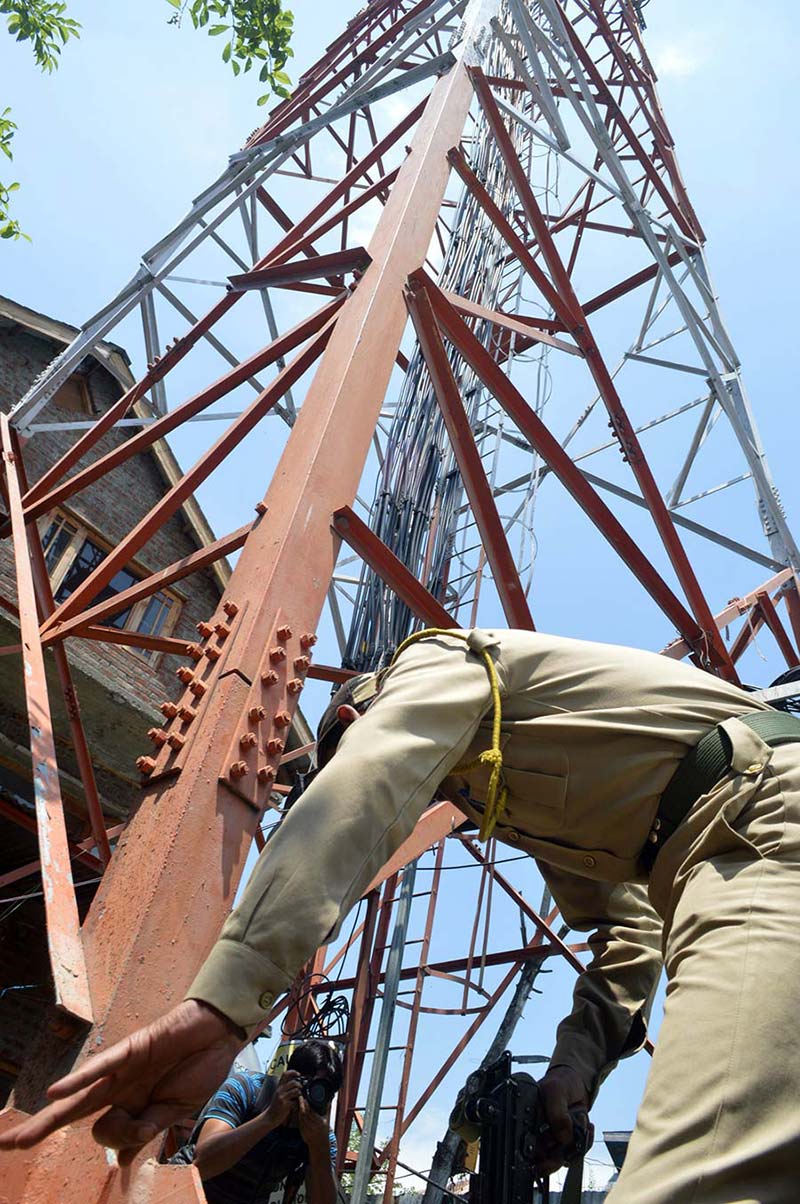Who Is Responsible For Attacks On Mobile Towers In Kashmir?
The tower in Srinagar which was attacked on Monday (Courtesy: Kashmir Life)

SRINAGAR : The crisis in Jammu and Kashmir’s mobile telephony worsened when suspected militants lobbed a "grenade" at a mobile tower in the summer capital Srinagar, days after two people were killed in north Kashmir in similar attacks.
Reports said the attack took place in the compound of a residential house owned by Abdul Ahad Haji at Gadoodbagh in Habbakadal, which houses two towers of telecom companies.
A Jammu and Kashmir police officer said Shahwar Imtiyaz, son of Ghulam Mohammad Ahanger, sustained injuries while a vehicle parked in the compound was also damaged by the impact of the blast.
The injured man was referred to SMHS hospital Srinagar where his condition is said to be stable.
"We are investigating the matter. We have taken samples from the site of blast to analyse the nature of explosive," the officer said.
He refused to comment on the nature of explosives used in the attack.
Hours after the attack, Kashmir BSNL Tower Landlords Welfare Organisation announced shut down operation of BSNL towers across the Valley. “
“We are going to close their operations from Monday evening," said Shabir Ahmad Lone, President of the organisation.
He said an emergency meeting of the organisation was held on Monday evening and it was "unanimously" decided to shutdown the operation of BSNL towers installed on private land across the Valley.
The attack is the first attack of its kind in Srinagar after an unknown outfit, Lashkar-i-Islam, launched a series of similar attacks in North Kashmir. Four attacks happened in quick succession in North Kashmir’s Sopore, Pattan and Handwara areas against cellular company workers and also against the civilians who have rented out space for installation of towers.
The attacks have caused the death of two persons dead and have left at least four injured. Those killed were identified as Ghulam Hassan Dar of Dooru, Sopore and Imtiyaz Ahmad of Pattan. Both were tower landlords as they had rented out space to a cellular company for installing towers in their compounds.
This new form of trouble, aimed at disturbing peace and tranquillity in the Kashmir valley, started with some threat posters circulated in North Kashmir purportedly by a lesser-known outfit called ‘Lashkar-e-Islam’, asking cellular companies to immediately shut down their operations in the Himalayan region.
Sources said the militants are upset about the loss of a communication equipment from a mobile tower in Sopore earlier this month, "They (militants) had installed a communication equipment on a mobile tower which helped them in avoiding surveillance by security agencies," the official said.
The attacks have sparked fear among people associated with the telecom companies across Kashmir with many retailers of telecom companies downing their shutters to escape from the wrath of militants.
The communication lines are snapped and mobile signals are also fading in some areas because of the snag caused to the towers. These attacks have caused panic in the entire Kashmir region.
After North Kashmir, telecom operators on Monday shut shops in many parts of South Kashmir as well. Reports said unknown men barged into many mobile recharge outlets in south Kashmir and warned the retailers of “dire consequences” if they won’t wind up their services.
“Some men came to my shop and warned me to stop recharging mobile phones. They said if I didn't obey them, I should be prepared to face the consequences,” a mobile retailer in Anantnag town said.
Sources said several towers and telecom offices were shut in the town on Monday in the face of threats. “My mobile stopped working in the morning and I am not able to call my family. They must be worried about me,” said a resident of Kulgam.
Similar reports were received from Shopian and Pulwama districts of south Kashmir.
The attacks have mystified the security agencies in the state who have so far failed to nab the culprits.
On Saturday, the Jammu & Kashmir’s Chief Minister, Mufti Mohammad Sayeed, on the sidelines of a function at Sher-i-Kashmir International Convention Centre (SKICC) in Srinagar had told journalists that “the situation in North Kashmir is a temporary phase.”
Sayeed had also expressed hope that such incidents “would not stop us (the government) from bringing peace in the valley”.
Unfortunately the attacks did not stop in North Kashmir and instead reached Srinagar.
What Sayeed hoped would only be a “temporary phase” appears to have a certain pattern to it, the apparent aim being to derail progress and development in Kashmir.
While the police has blamed the Pakistan-based militant outfit, Hizbul Mujahideen, for the attacks, Hizb, on the other hand, has denied any involvement.
Rather Hizb has alleged that the attacks were carried out by security agencies to "defame the freedom struggle of the people of Jammu and Kashmir."
Similar views were echoed by other resistance leaders in Kashmir as well.
Syed Ali Shah Geelani, Chairman of the Jammu and Kashmir Tehreek-e-Hurriyat (TeH), while strongly deploring these attacks cautiously blamed the Indian intelligence agencies for “fomenting trouble to denigrate ‘Mujahideen’ of Kashmir.”
“Our organisation (TeH) had asked the United Jihad Council (UJC) to investigate these attacks and reveal truth about this strange organisation. Today the UJC has made it clear in its statement that ‘Lashkar-e-Islam’ has no links with the UJC and is India-sponsored,” Syed Ali Geelani told The Citizen overn phone.
The United Jihad Council, headed by Syed Salahuddin, is an amalgam of various militant outfits based in Pakistan-administered Kashmir.
Jammu and Kashmir Liberation Front (JKLF) chief Yasin Malik also condemned the recent attacks in North Kashmir and Srinagar.



